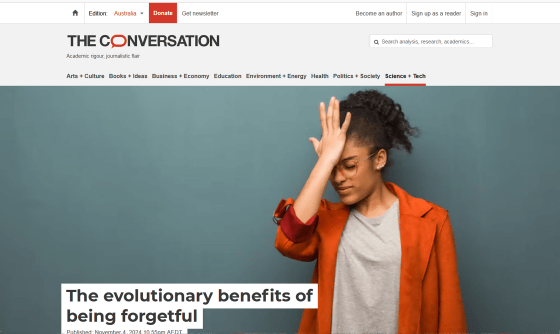Researchers claim that forgetfulness has an evolutionary advantage

Most people have experienced forgetfulness, such as 'I opened my browser to look something up and forgot what I wanted to look up,' or 'I can't remember the name of someone I've definitely met.' Many people may think, 'I wish I could remember all my memories forever,' but
The evolutionary benefits of being forgetful
https://theconversation.com/the-evolutionary-benefits-of-being-forgetful-242629

One of the earliest discoveries about forgetfulness was that the average person's memory gradually fades and they forget things even without any memory impairment. Hermann Ebbinghaus , a 19th century German psychologist, is known for discovering the forgetting curve, which shows how quickly memories, especially long-term memories, are lost.
Below is a graph of the forgetting curve, with the vertical axis representing memory and the horizontal axis representing time. People forget new things they have learned over time, just like this curve, and the existence of the forgetting curve has been confirmed in recent research .

While some may think that forgetting memories only has disadvantages, Vanneste and his colleagues point out that 'forgetting also has a functional purpose. People's brains are constantly bombarded with information, so if we remembered every single detail of that information, it would be difficult to retain important information.
One way to avoid this is to not pay enough attention to the details of the information in the first place. Nobel Prize-winning neuroscientist
In other words, by paying attention to something, the brain strengthens synapses, allowing the memory to be retained. This is the same mechanism by which people forget unnecessary information, so remembering something is inextricably linked to forgetting.
Also, people's memories do not stay the same forever; sometimes memories need to be updated according to circumstances. For example, people usually remember their usual commute route, but if a road along the way is closed for a while due to construction or other reasons, they must re-memorize a commute route that bypasses that road. In such a case, the brain weakens the synapses of the original route while at the same time strengthening the synapses for memorizing the new route.

If you are unable to forget all of your memories, this can have serious negative consequences.
'From an evolutionary perspective, it is certainly beneficial to forget old memories in response to new information,' Vanneste and colleagues wrote. 'Our hunter-gatherer ancestors may have visited a safe watering hole many times, but if one day they discovered a rival settlement there or a newborn cub, their brains needed to be able to update the memory to label this place as no longer safe. Failure to do so would threaten their survival.'
And a 2014 study in mice found that artificially activating the neuronal connections associated with a previously isolated memory could revive the memory, suggesting that the memory isn't lost entirely, just that our ability to access it is altered.
In fact, many people have probably experienced the ' tip of the tongue phenomenon ,' where they can't remember a specific word but can remember a lot of information about it. There are theories that the tip of the tongue phenomenon occurs as a result of a weakening of the connection between words and meanings, or that it functions as a signal that the memory hasn't been lost.

'In short, we forget information for many reasons: because we weren't paying attention, or because the information decayed over time. We may forget in order to refresh our memories. And forgotten information is not lost forever; it just becomes inaccessible. All of this forgetting helps our brains function efficiently and has supported our survival for generations,' Vanneste and his colleagues wrote, arguing that forgetting has an evolutionary advantage.
Related Posts:
in Science, Posted by log1h_ik







